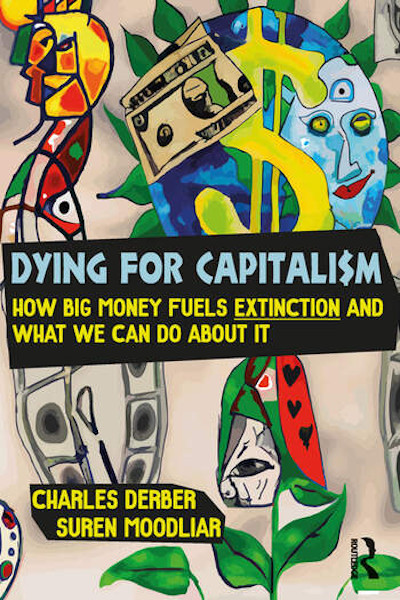Green Capitalism Will Not Solve Climate Change

(Photo credit: Depositphotos.com)
Many Americans – even those who recognize capitalism’s destructive impacts – find the idea of discarding capitalism for a more just system unimaginable. Yes, capitalism is part of the problem. But, they think, realistically, the world is not going to invent anytime fast a visionary postcapitalist system. Meanwhile we barrel toward environmental destruction. If we’re going to be pragmatic, as millions of concerned Americans believe, we should listen to the growing number of capitalist leaders and companies who are taking climate change seriously and proposing their own solution: green capitalism.
Capitalist companies are already responding to market incentives promoting green technologies that are important in slowing climate change. In fact, Big Tech leaders such as Bill Gates are beginning to focus on climate change, with Gates writing a 2021 book on how to transform the world to save the environment. But a closer look shows that Gates, like most corporate leaders in the United States and around the world, sees climate change as mainly a technological problem to be solved not by system change or politics but by innovative technologies. Gates starts off saying he is not a political guy but a tech expert. New technologies can get carbon emissions way down, without needing to distract ourselves with the giant and disagreeable task of changing our economic system. In fact, in his view, it is the Big Tech capitalist companies, as well as the smaller tech capitalist entrepreneurs that will solve climate change; capitalism is not the problem but the solution.

(Photo credit: Depositphotos.com)
Gates’s technological approach to the climate crisis typifies the “progressive” capitalist factions, including powerful capitalist groups in Europe and the developing world, willing to acknowledge a deep climate crisis. Technological innovation on a grand scale, subsidized by states when necessary, makes “green” capitalists like Gates believe even more fervently in capitalism because they see it as the only system generating and rewarding technological initiatives of the kind necessary to stop climate change.
Moreover, because they see markets as rational and responsive to consumers, increasing public concern about flooding, drought, and extreme heat, are likely viewed as providing the “market signals” that will presumably increase the profitability of green investments. Twenty-first-century capitalist entrepreneurs – people like Elon Musk who have already made a fortune from electric cars – see this as the wave of the future. And even big corporations will end up on the global green capitalist wave. GM has announced it plans to stop producing gas engine cars by 2035 and go fully electric. Ford is building its electric F-150 Lightening trucks – one of the most popular vehicles in America – and plans to dramatically increase its electric truck and car fleet, President’ Biden’s 2023 executive order that half of all new US cars and trucks must be electric by 2030. Many other huge global companies are promising to drastically reduce their carbon emissions; Amazon has pledged to reach net-zero emissions by 2040 and Walmart promises to eliminate emissions by 2035. Their expectation is that the entire global capitalist system will follow – and save the planet.
This “capitalist solution” is seductive but deeply flawed. “Green” technology, such as wind turbines, solar panels, and electric cars, incurs grave environmental costs:

(Photo credit: Depositphotos.com)
Every stage of the life cycle of any manufactured product exacts environmental costs: habitat destruction, biodiversity loss and pollution (including carbon emissions) from extraction of raw materials, manufacturing/ construction, through to disposal. Thus, it is the increasing global material footprint that is fundamentally the reason for the twin climate and ecological crises.
As material or resource costs escalate, both climate change and material depletion imperil survival and the environment.
Since unlimited growth is in the DNA of capitalism, the shift to green technology is not enough to prevent environmental destruction. The tech-based vision, by focusing simply on technology, ignores all the other aspects of capitalism – from profit maximization to the public goods deficit to commodity fetishism as well as unlimited growth – that cause environmental destruction.

(Photo credit: Depositphotos.com)
The green tech capitalist solution actually protects the wealth and power of Big Tech and other corporations, and is likely to accelerate environmental destruction by deflecting focus from the underlying systemic aspects of capitalism fueling climate change. But this doesn’t mean we should ignore technology nor that capitalist innovation and reforms can’t play a role. Technology obviously has a major role to play in solving climate and other environmental crises. Where capitalist corporations seek to invest massive amounts of capital into non-carbon energy sources, this may help with the larger economic, social, and political changes that will need to ultimately transcend the capitalist-driven forces that green capitalists such as Gates claim to champion. The greening that is possible within capitalism is hugely important, when not used as a substitute for crucial system change.
The key is to accelerate the green innovation possible within capitalism while making larger systemic changes where these technologies can truly prevent extinction. In the current corporate order, despite the importance of electric cars and other green products, the purely technological approach de-linked from systemic change will not create a sustainable world.
Green capitalists’ reforms may be a step forward, but their claims of social responsibility should not be confused with actual solutions to the climate crisis. Even the biggest global corporate emission-spewers – Exxon, Royal Dutch Shell, BP, Chevron, and other large oil and gas companies – now advertise themselves as green companies, promoting a brand mixing renewables and fossil fuel together as the only road to prosperity and survival in a green capitalism. But these same companies used their money and political clout to prevent the necessary systemic changes that would solve the climate change crisis. In the United States, the American Petroleum Institute, the leading oil and gas lobbyist, put Exxon and Chevron’s money to work opposing Biden-proposed climate policy changes. Nevertheless, these companies brand themselves as “green.”

Green brands, according to extensive research, are most likely to create “green-washing” rather than sustainability. Global auto manufacturers are talking aspirations rather than committed realities to electric cars; and the US auto firms, also talking a good green story like Big Oil, tried in 2021 to limit stricter carbon emission standards introduced by the Biden Administration. As one Forbes commentator noted, the greenwashing temptation is inherent to work of industry leaders, “The allure of greenwashing sustainability initiatives often taps into what CEOs are best at: projecting confidence, managing risk, and creating followership.” Again, this does not mean that we should not use all the reforms in capitalism that actually contribute to mitigation. But we should also not confuse those reforms with solutions that will save humanity.
Adapted from Dying for Capitalism: How Big Money Fuels Extinction and What We Can Do About It. Published with permission.
Author Bios:
Charles Derber is Professor of Sociology at Boston College and has written 25 books. Most recently he is the coauthor of Dying for Capitalism: How Big Money Fuels Extinction and What We Can Do About It.
Suren Moodliar is editor of the journal Socialism and Democracy and coordinator of encuentro5, a movement-building space in downtown Boston. He is the coauthor of Dying for Capitalism: How Big Money Fuels Extinction and What We Can Do About It.
Highbrow Magazine
Image Sources:
--Routledge































































































































































































































































































































